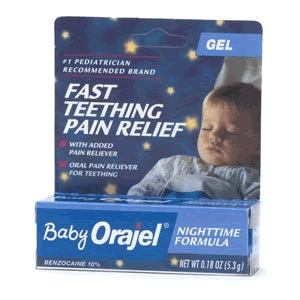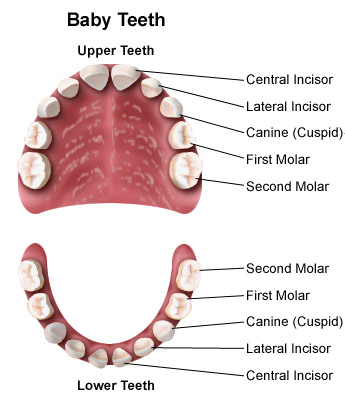Handling a toothache of a teething baby?
As your baby continues to grow, their teeth inside their mouth also grows out. This growing out of teeth in the baby’s mouth is called teething. All babies will experience them. At about 6 months of age, the first baby tooth already appears or erupts in the baby’s mouth. The eruption of teeth can be somewhat painful or uncomfortable to the baby.
When does your baby start teething?
When you see a rise or a lump with translucent whitish discoloration underneath your baby’s gum, it means your baby’s tooth is about to emerge. Babies usually start teething at about age of 6-7 months old. The first tooth to appear is the bottom central tooth (incisor).  This set of teeth is the primary teeth with a total of twenty (20) teeth. Most children will have their complete set of primary teeth at the age of 2-3 years old and lasted until 5-6 years old when their permanent adult teeth appeared. In total, there are thirty-two (32) permanent teeth.
The following are the average pattern of teething in babies. However, they may appear earlier or even at a later date but very rare in occurrence.
| Age | Teeth | Position |
| 6 to 7 months | Incisors | Two central bottom & Two central top teeth. |
| 7 to 9 months | Two more incisors | Top & bottom neighbouring teeth; making four top & four bottom teeth in all. |
| 12 to 16 months | First molars | Double teeth for chewing |
| 16 to 20 months | Canines | The pointed teeth or “fangs†|
| 1 ¾ – 2 ½ years | Second molars | Another double teeth for chewing |
Is it painful when your baby is teething
Symptoms may vary based on individual child. Some may experience pain but some may not, but be sure to check with your dentist to rule out any other possible causes for the symptoms.
For example,
- Increased crying and crankiness
- Soreness and irritability of your baby’s gums. Reddish in colour and feeling hard.
- Low grade fever
- Experience pain at night
- More frequent drooling of saliva which can cause chin rash and coughing/gagging
- Feeling the urge to bite and chew
- Cold-like symptoms (running nose)
- Diarrhea
- Cheek rubbing and ear pulling
It is very difficult to identify when your baby is teething especially once the child is in distress and irritated. However, be aware of these symptoms and consult your physician if necessary.
 How to soothe your teething baby’s toothache?
How to soothe your teething baby’s toothache?
- Pain relief
It is safe to use Paracetamol or Ibuprofen (in a lower dosage) when your baby is having low grade fever. It will ease your baby’s tooth pain to a certain extent. However, if your baby’s fever is above 38 Celcius (104 F) and with symptoms, you should directly consult your physician immediately. There are common brands of oral aid gels in the market for e.g. Oragel or OralSoothe Teething Granules which you can get it at your nearest pharmacy store.
- Clean and dry
Keep your baby clean and dry from drooling of saliva to prevent skin rash. If your baby is feeling the urge to chew, give them something to bite on. It is a method of pain management because as the teeth grow, the gum tissue will begin to break down to allow the teeth to come through. The pressure from biting will help to reduce the pain and ease the breakdown of the gums.
- Cold therapy
Give your baby a chilled teething ring or toy or ice pops or use a frozen moist cloth to alleviate your baby’s sore gums. Ice-creams or cold purees are a good option too. But do not give your babies ice cubes as it is a choking hazard.
- Gum Massage
Massaging gives the pressure which will help to reduce your baby’s sore gums and discomfort. You can use your fingers or a moist cloth to massage. But, remember to wash your hands before massaging to avoid introducing bacteria into your baby’s mouth.
- Homeopathic remedies
There are gels, cream, tablets or even teething cookies you can get it over-the-counter to help relieve your baby’s toothache. These include herbs and oils such as clove oil, licorice stick, basil plant, honeybee or chamomile which are safe to use. Clove oil is a common remedy to alleviate toothache. Clove oils has the numbing effect properties  so that even holding a whole clove against a sore tooth with your tongue can ease the pain long enough to get to your dentist. Clove oil can be rubbed on sore gums but only use a tiny amount, because too much can upset your baby’s stomach.
- Visit your dentist
If your baby’s toothache still persists for a long period of time, you should visit your dentist for further management.


It is so hard when you see your baby hurting while she or he is at the stage of teething. That is why more experts had developed some teething gel to make teething for babies not a painful one. As on my experience, it is very cool and good for babies.